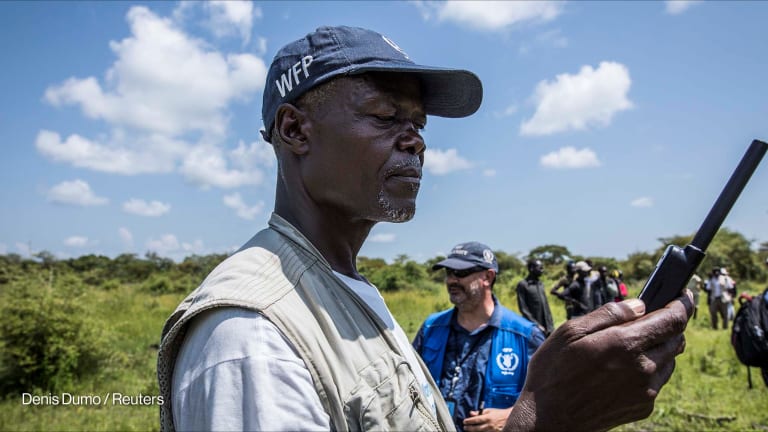
BRUSSELS — As the fight against COVID-19 emphasizes the need for proper hygiene, Oxfam has launched a new hand-washing station it hopes will provide an alternative to the ubiquitous tippy tap in humanitarian settings.
The stations, designed with funding from Elrha, a charity focused on humanitarian innovation, feature a mirror and flat space for posters, designed to make them more attractive to use. With a lockable lid, the 24-liter (6 gallons) tank provides enough water for more than 200 hand-washes from antimicrobial brass taps. There is a 4-liter tank for soapy water, which users can wash their hands with before rinsing them with plain water, although hard soap can also be tied to the device.
How to make WASH projects more inclusive
Even where WASH facilities are available, not everybody has access. Experts discuss how the sector can work toward more inclusive programming.
Until now one of the most common methods for people to wash their hands in areas with no running water has been a tippy tap, a bucket of water that the user can tip downward with the aid of a stick on the ground.
However, designer Matthew White, who worked on the Oxfam project, told Devex that “for a humanitarian solution [a tippy tap] is inhumane.”
“The tippy taps are just people literally pushing with their foot and the water dumping out all over them as they are trying to wash their hands and on their feet onto the muddy floor, making them dirty,” White said. “We talked a lot early on in the project about dignity … This solution hopefully gives a bit of dignity but also is really practical. It goes from something where I think people avoided washing their hands to something where hopefully people will enjoy that and feel like they are being treated well.”
Ed Blagden, head of the Oxfam Supply Centre, told Devex by email that the new hand-washing stand has a number of advantages over the tippy tap.
“Our trials have shown that the mirrors and colourful design attract more people to wash their hands for longer,” Blagden wrote. “It is far more durable than a tippy tap and the basin and drainage hose help to prevent muddy puddles. It also uses water-saving taps which dispense just enough water to wash your hands, and has the benefit of a separate dispenser for soapy water that helps get hands even cleaner."
The idea for the station began when Oxfam was inspired by an A-frame handwashing solution made by U.K. school students in 2015, in response to an Oxfam challenge. The following year, the charity’s water and sanitation team took the idea to Elrha’s humanitarian innovation fund for further development. After the final design was agreed, testing was carried out in refugee camps in Tanzania and Uganda, informing further prototypes that were easier to assemble with more durable parts.
Partly to take advantage of low-cost mass manufacturing techniques, the stations are made in China, which delayed production in early 2020 as the Wuhan region locked down due to COVID-19.
Production eventually began in July and around 4,000 hand-washing stands have been produced so far. An Oxfam spokesperson said an initial 1,700 were sent for use in Oxfam programs in the Democratic Republic of the Congo, Yemen, Chad, Kenya, Ethiopia, Burkina Faso, and Bangladesh, with a further 2,300 sent in December, including to Algeria and South Sudan. A box of six kits — which are designed to travel by half-dozen lots in palettes — cost £308 ($422).
“Guys coming back from the field [said] ‘this thing has to cost almost nothing, there is no money and we need lots of them,’” White said. “That really changed things to really focus on driving down costs.” Aside from the price, he said the taps also needed to be robust, vandal-proof, and able to fit neatly into pallets for shipment.
The stations are also available for purchase by other humanitarian agencies, though Oxfam says it makes no profit on sales through its supply center. It has also made the technical specifications public to allow others to manufacture the stations themselves.
Cecilie Hestbaek, senior innovation manager at Elrha, told Devex that the long-term plan is to encourage local production in the countries where the tap is used.
Search for articles
Most Read
- 1
- 2
- 3
- 4
- 5








